运动营养学 英文
- 格式:ppt
- 大小:570.00 KB
- 文档页数:30
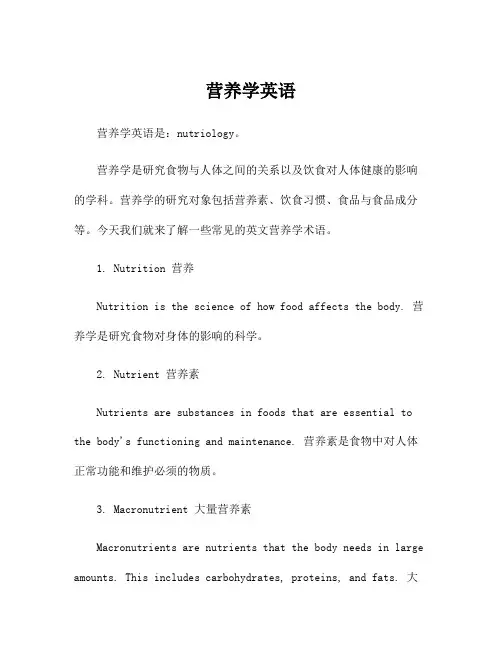
营养学英语营养学英语是:nutriology。
营养学是研究食物与人体之间的关系以及饮食对人体健康的影响的学科。
营养学的研究对象包括营养素、饮食习惯、食品与食品成分等。
今天我们就来了解一些常见的英文营养学术语。
1. Nutrition 营养Nutrition is the science of how food affects the body. 营养学是研究食物对身体的影响的科学。
2. Nutrient 营养素Nutrients are substances in foods that are essential to the body's functioning and maintenance. 营养素是食物中对人体正常功能和维护必须的物质。
3. Macronutrient 大量营养素Macronutrients are nutrients that the body needs in large amounts. This includes carbohydrates, proteins, and fats. 大量营养素是身体需要摄入的数量较多的营养素,包括碳水化合物、蛋白质和脂肪。
4. Micronutrient 微量营养素Micronutrients are nutrients that the body needs in smaller amounts. This includes vitamins and minerals. 微量营养素是身体需要少量摄入的营养素,包括维生素和矿物质。
5. Calories 卡路里Calories are a unit of energy that is found in food. 卡路里是食物中的能量单位。
6. Carbohydrate 碳水化合物Carbohydrates are a macronutrient that provides the body with energy. 碳水化合物是一种大量营养素,能够为身体提供能量。
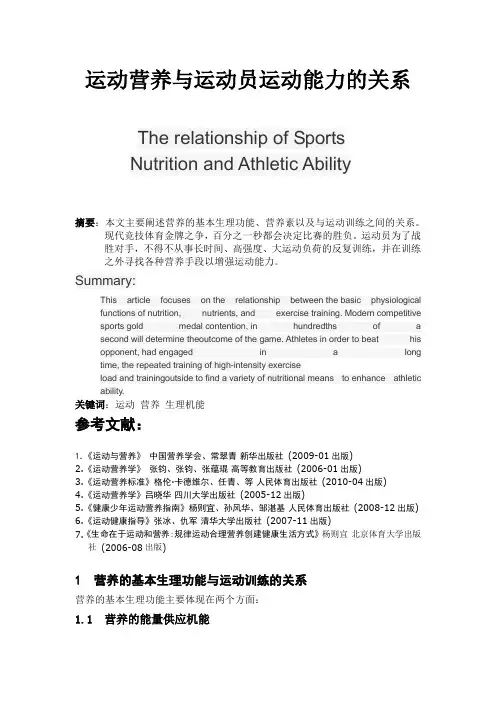
运动营养与运动员运动能力的关系The relationship of SportsNutrition and Athletic Ability摘要:本文主要阐述营养的基本生理功能、营养素以及与运动训练之间的关系。
现代竞技体育金牌之争,百分之一秒都会决定比赛的胜负。
运动员为了战胜对手,不得不从事长时间、高强度、大运动负荷的反复训练,并在训练之外寻找各种营养手段以增强运动能力。
Summary:This article focuses on the relationship between the basic physiological functions of nutrition, nutrients, and exercise training. Modern competitive sports gold medal contention, in hundredths of a second will determine theoutcome of the game. Athletes in order to beat his opponent, had engaged in a long time, the repeated training of high-intensity exerciseload and trainingoutside to find a variety of nutritional means to enhance athletic ability.关键词:运动营养生理机能参考文献:1.《运动与营养》中国营养学会、常翠青新华出版社(2009-01出版)2.《运动营养学》张钧、张钧、张蕴琨高等教育出版社(2006-01出版)3.《运动营养标准》格伦·卡德维尔、任青、等人民体育出版社(2010-04出版)4.《运动营养学》吕晓华四川大学出版社(2005-12出版)5.《健康少年运动营养指南》杨则宜、孙风华、邹湛基人民体育出版社(2008-12出版)6.《运动健康指导》张冰、仇军清华大学出版社(2007-11出版)7.《生命在于运动和营养:规律运动合理营养创建健康生活方式》杨则宜北京体育大学出版社(2006-08出版)1 营养的基本生理功能与运动训练的关系营养的基本生理功能主要体现在两个方面:1.1 营养的能量供应机能营养是指机体从外界环境中摄取物质,通过自身的消化,吸收及利用以维持生存和健康的整个过程。
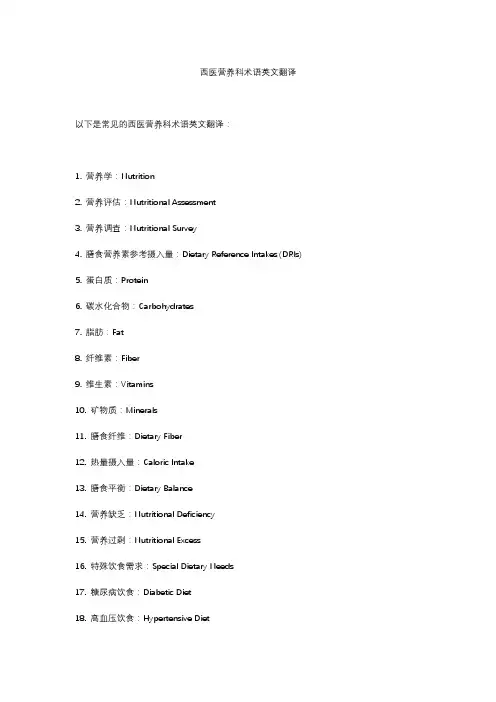
西医营养科术语英文翻译以下是常见的西医营养科术语英文翻译:1. 营养学:Nutrition2. 营养评估:Nutritional Assessment3. 营养调查:Nutritional Survey4. 膳食营养素参考摄入量:Dietary Reference Intakes (DRIs)5. 蛋白质:Protein6. 碳水化合物:Carbohydrates7. 脂肪:Fat8. 纤维素:Fiber9. 维生素:Vitamins10. 矿物质:Minerals11. 膳食纤维:Dietary Fiber12. 热量摄入量:Caloric Intake13. 膳食平衡:Dietary Balance14. 营养缺乏:Nutritional Deficiency15. 营养过剩:Nutritional Excess16. 特殊饮食需求:Special Dietary Needs17. 糖尿病饮食:Diabetic Diet18. 高血压饮食:Hypertensive Diet19. 低钠饮食:Low Sodium Diet20. 低脂饮食:Low Fat Diet21. 素食饮食:Vegetarian Diet22. 全营养饮食:Complete Nutrition Diet23. 禁食:Fasting24. 口服营养补充剂:Oral Nutritional Supplements25. 管饲营养:Tube Feeding26. 强化食品:Fortified Foods27. 纯化食品:Purified Foods28. 食物过敏:Food Allergies29. 食物不耐受:Food Intolerances30. 肠内营养:Enteral Nutrition31. 肠外营养:Parenteral Nutrition32. 有机食品:Organic Foods33. 无麸质食品:Gluten-free Foods34. 天然食品:Natural Foods35. 低糖食品:Low-sugar Foods36. 高纤维食品:High-fiber Foods37. 低卡食品:Low-calorie Foods38. 儿童营养:Childhood Nutrition39. 孕妇营养:Pregnancy Nutrition40. 老年人营养:Senior Nutrition。
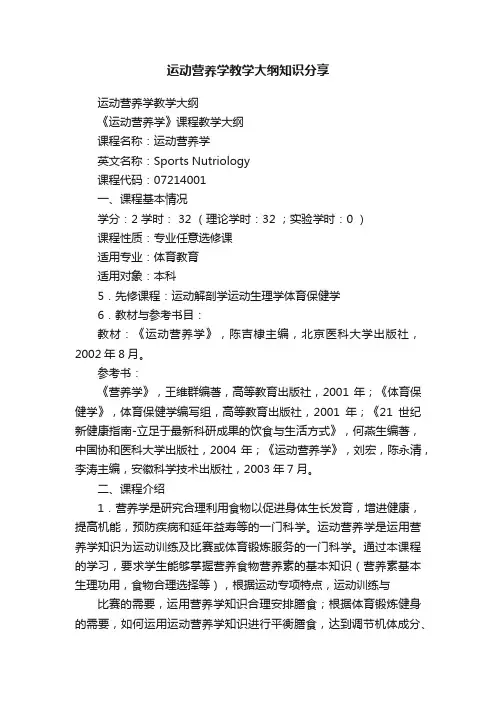
运动营养学教学大纲知识分享运动营养学教学大纲《运动营养学》课程教学大纲课程名称:运动营养学英文名称:Sports Nutriology课程代码:07214001一、课程基本情况学分:2 学时: 32 (理论学时:32 ;实验学时:0 )课程性质:专业任意选修课适用专业:体育教育适用对象:本科5.先修课程:运动解剖学运动生理学体育保健学6.教材与参考书目:教材:《运动营养学》,陈吉棣主编,北京医科大学出版社,2002年8月。
参考书:《营养学》,王维群编著,高等教育出版社,2001年;《体育保健学》,体育保健学编写组,高等教育出版社,2001年;《21世纪新健康指南-立足于最新科研成果的饮食与生活方式》,何燕生编著,中国协和医科大学出版社,2004年;《运动营养学》,刘宏,陈永清,李涛主编,安徽科学技术出版社,2003年7月。
二、课程介绍1.营养学是研究合理利用食物以促进身体生长发育,增进健康,提高机能,预防疾病和延年益寿等的一门科学。
运动营养学是运用营养学知识为运动训练及比赛或体育锻炼服务的一门科学。
通过本课程的学习,要求学生能够掌握营养食物营养素的基本知识(营养素基本生理功用,食物合理选择等),根据运动专项特点,运动训练与比赛的需要,运用营养学知识合理安排膳食;根据体育锻炼健身的需要,如何运用运动营养学知识进行平衡膳食,达到调节机体成分、促进身体机能提高等健康目的。
2.运动营养学是体育教育专业的一门专业任意选修课,其相关基础理论课程是运动解剖学、运动生理学、运动生物化学、运动生物力学等。
3.通过教学使学生掌握运动营养学的基本理论、基本知识和基本技能,为今后从事体育教学、训练、比赛及饮食防治某些常见病等方面发挥应有的作用。
教学中要以启发式讲授为主,结合问题讨论、自学指导等方法进行教学。
教学手段上采用多媒体辅助教学。
三、课程内容、学时分配及教学基本要求绪论(总2学时)(一)教学内容:知识点:食品、营养学、运动营养学的概念、任务,营养和健康的关系,运动营养与体育运动的关系,运动营养学发展概况教学重点:营养学、运动营养学的概念,营养与健康的关系教学难点:合理营养对机体的影响(二)教学基本要求:掌握营养学、运动营养学的概念内容及任务,了解运动营养学学科的发展任务,掌握营养与运动的关系。

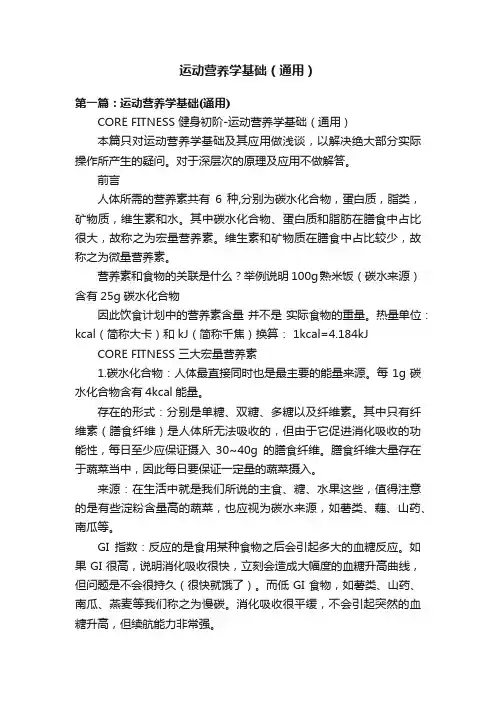
运动营养学基础(通用)第一篇:运动营养学基础(通用)CORE FITNESS 健身初阶-运动营养学基础(通用)本篇只对运动营养学基础及其应用做浅谈,以解决绝大部分实际操作所产生的疑问。
对于深层次的原理及应用不做解答。
前言人体所需的营养素共有6种,分别为碳水化合物,蛋白质,脂类,矿物质,维生素和水。
其中碳水化合物、蛋白质和脂肪在膳食中占比很大,故称之为宏量营养素。
维生素和矿物质在膳食中占比较少,故称之为微量营养素。
营养素和食物的关联是什么?举例说明 100g熟米饭(碳水来源)含有25g碳水化合物因此饮食计划中的营养素含量并不是实际食物的重量。
热量单位:kcal(简称大卡)和 kJ(简称千焦)换算: 1kcal=4.184kJ CORE FITNESS 三大宏量营养素1.碳水化合物:人体最直接同时也是最主要的能量来源。
每1g碳水化合物含有4kcal能量。
存在的形式:分别是单糖、双糖、多糖以及纤维素。
其中只有纤维素(膳食纤维)是人体所无法吸收的,但由于它促进消化吸收的功能性,每日至少应保证摄入30~40g的膳食纤维。
膳食纤维大量存在于蔬菜当中,因此每日要保证一定量的蔬菜摄入。
来源:在生活中就是我们所说的主食、糖、水果这些,值得注意的是有些淀粉含量高的蔬菜,也应视为碳水来源,如薯类、藕、山药、南瓜等。
GI指数:反应的是食用某种食物之后会引起多大的血糖反应。
如果GI很高,说明消化吸收很快,立刻会造成大幅度的血糖升高曲线,但问题是不会很持久(很快就饿了)。
而低GI食物,如薯类、山药、南瓜、燕麦等我们称之为慢碳。
消化吸收很平缓,不会引起突然的血糖升高,但续航能力非常强。
2.蛋白质:组成人体一切细胞、组织的重要成分。
机体所有重要的组成部分都需要有蛋白质的参与。
可以提供能量。
每1g蛋白质含有4cal能量。
存在的形式:多种不同类型的氨基酸脱水缩合形成互不相同的蛋白质。
摄入的蛋白质在体内分解成各种氨基酸,用以合成各种人体所需蛋白质(修复肌肉)。
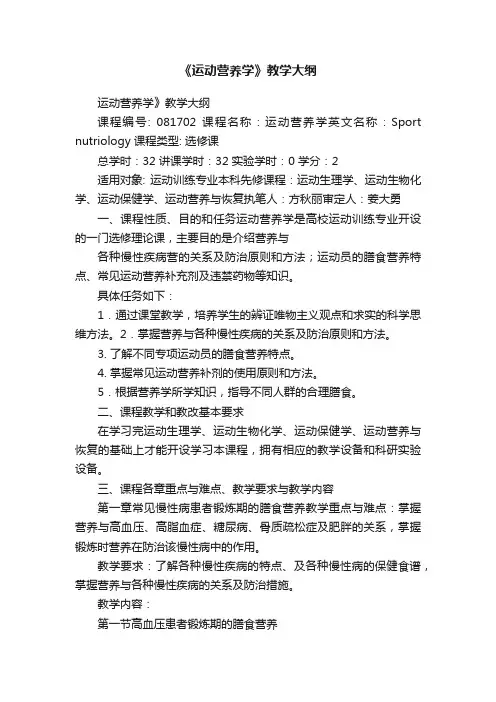
《运动营养学》教学大纲运动营养学》教学大纲课程编号: 081702 课程名称:运动营养学英文名称:Sport nutriology 课程类型: 选修课总学时:32 讲课学时:32 实验学时:0 学分:2适用对象: 运动训练专业本科先修课程:运动生理学、运动生物化学、运动保健学、运动营养与恢复执笔人:方秋丽审定人:姜大勇一、课程性质、目的和任务运动营养学是高校运动训练专业开设的一门选修理论课,主要目的是介绍营养与各种慢性疾病营的关系及防治原则和方法;运动员的膳食营养特点、常见运动营养补充剂及违禁药物等知识。
具体任务如下:1.通过课堂教学,培养学生的辨证唯物主义观点和求实的科学思维方法。
2.掌握营养与各种慢性疾病的关系及防治原则和方法。
3. 了解不同专项运动员的膳食营养特点。
4. 掌握常见运动营养补剂的使用原则和方法。
5.根据营养学所学知识,指导不同人群的合理膳食。
二、课程教学和教改基本要求在学习完运动生理学、运动生物化学、运动保健学、运动营养与恢复的基础上才能开设学习本课程,拥有相应的教学设备和科研实验设备。
三、课程各章重点与难点、教学要求与教学内容第一章常见慢性病患者锻炼期的膳食营养教学重点与难点:掌握营养与高血压、高脂血症、糖尿病、骨质疏松症及肥胖的关系,掌握锻炼时营养在防治该慢性病中的作用。
教学要求:了解各种慢性疾病的特点、及各种慢性病的保健食谱,掌握营养与各种慢性疾病的关系及防治措施。
教学内容:第一节高血压患者锻炼期的膳食营养一、营养与高血压(一)高血压1.血压水平的定义和分类2.血压水平的分级标准3.血压测量的最佳时间4.高血压疾病的信号5.高血压的治疗(二)营养与高血压1.高盐饮食与高血压2.高能量饮食与高血压3.食物与药物之间相互作用与高血压二、高血压患者锻炼期的膳食营养安排三、高血压患者常用的保健食谱第二节高脂血症患者锻炼期的膳食营养一、营养与高脂血症1.血脂正常值2.高脂血症的分类3.高脂血症的症状4.高脂血症的治疗(二)营养与高脂血症1.脂类2.糖类与膳食纤维二、高脂血症患者锻炼期的膳食营养安排三、高脂血症患者常用的保健食谱第三节糖尿病患者锻炼期的膳食营养一、营养与糖尿病(一)糖尿病1.糖尿病的诊断2.糖尿病的分类3.糖尿病的典型症状4.造成糖尿病的环境因素(二)营养与糖尿病1.蛋白质2.脂肪3.糖类4.膳食纤维5.微量元素6.维生素7.其他膳食成分二、糖尿病患者锻炼期的膳食营养安排三、糖尿病患者常用的保健食谱第四节骨质疏松症患者锻炼期的膳食营养一、营养与骨质疏松症(一)骨质疏松症1.诊断2.骨质疏松症的分类3.骨质疏松症的症状4.老年人治疗骨质疏松的三大误区(二)营养与骨质疏松症1.钙2.VD3.磷4.镁5.微量元素6.蛋白质7.维生素8.植物激素二、骨质疏松症患者锻炼期的膳食营养安排三、骨质疏松症患者常用的保健食谱第五节肥胖症患者锻炼期的膳食营养一、营养与肥胖(一)肥胖1.评定标准2.肥胖的分类3.肥胖的危害(二)营养与肥胖的关系1.能量代谢与肥胖:糖代谢、脂肪代谢2.膳食结构与肥胖3.膳食纤维与肥胖4.几种能预防肥胖的中草药二、肥胖症患者锻炼期的膳食营养安排1.限制膳食热量2.适当的营养素分配比例3.改变饮食习惯4.注意多饮水5.控制饮食应持之以恒6.营养干预三、肥胖症患者常用的保健食谱复习题1.试述高血压疾病的信号以及高血压患者锻炼后的膳食营养安排2.试述高脂血症的危害、高脂血症锻炼后的膳食营养安排3.试述糖尿病的可能病因及营养在防治糖尿病中的作用4.试述糖尿病锻炼期的膳食营养安排5.试述骨质疏松症锻炼期的营养安排6.试述肥胖的危害以及能量与肥胖的关系7.试述营养在减肥中的作用以及肥胖症患者锻炼期的膳食营养安排第二章运动员膳食营养教学重点与难点:重点讲解不同项群运动员训练的生理学特征和膳食营养特点,难点掌握运动员训练和比赛不同阶段的膳食营养措施。
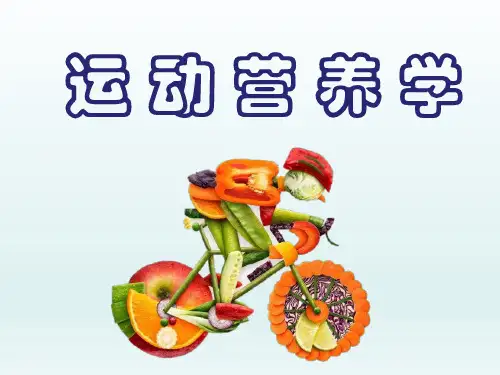
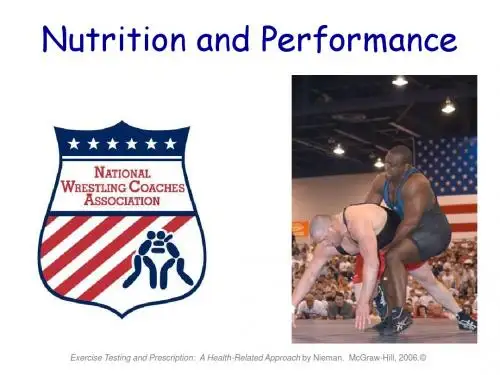
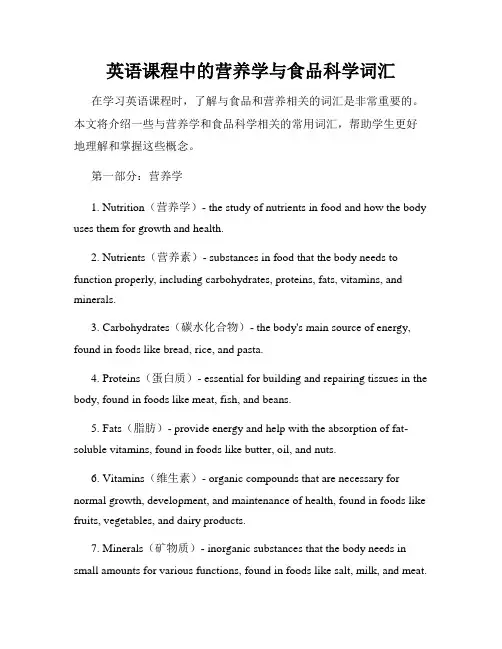
英语课程中的营养学与食品科学词汇在学习英语课程时,了解与食品和营养相关的词汇是非常重要的。
本文将介绍一些与营养学和食品科学相关的常用词汇,帮助学生更好地理解和掌握这些概念。
第一部分:营养学1. Nutrition(营养学)- the study of nutrients in food and how the body uses them for growth and health.2. Nutrients(营养素)- substances in food that the body needs to function properly, including carbohydrates, proteins, fats, vitamins, and minerals.3. Carbohydrates(碳水化合物)- the body's main source of energy, found in foods like bread, rice, and pasta.4. Proteins(蛋白质)- essential for building and repairing tissues in the body, found in foods like meat, fish, and beans.5. Fats(脂肪)- provide energy and help with the absorption of fat-soluble vitamins, found in foods like butter, oil, and nuts.6. Vitamins(维生素)- organic compounds that are necessary for normal growth, development, and maintenance of health, found in foods like fruits, vegetables, and dairy products.7. Minerals(矿物质)- inorganic substances that the body needs in small amounts for various functions, found in foods like salt, milk, and meat.8. Fiber(纤维素)- a type of carbohydrate that is not digested by the body but is important for maintaining a healthy digestive system, found in foods like whole grains, fruits, and vegetables.第二部分:食品科学1. Food Science(食品科学)- the study of the physical, chemical, and biological properties of food and the ways in which food is processed.2. Food Safety(食品安全)- the practice of handling, preparing, and storing food in ways that prevent foodborne illnesses.3. Foodborne Illness(食物中毒)- an illness caused by consuming contaminated food or drink, often resulting in symptoms such as nausea, vomiting, and diarrhea.4. Food Additives(食品添加剂)- substances added to food to enhance flavor, texture, appearance, or shelf life, such as preservatives, flavor enhancers, and colorings.5. Food Processing(食品加工)- the transformation of raw ingredients into food products, often involving techniques like cutting, grinding, cooking, and preserving.6. Food Labeling(食品标签)- the information provided on food packaging that includes ingredients, nutritional content, and allergy warnings.7. Organic Food(有机食品)- food that is grown without the use of synthetic fertilizers, pesticides, or genetically modified organisms (GMOs).8. Genetically Modified Organisms (GMOs)(转基因生物)- organisms whose genetic material has been altered in a way that is not naturally occurring, often used in agriculture to improve crop yield or resistance to pests.通过学习以上词汇,学生可以更好地了解与营养学和食品科学相关的概念。
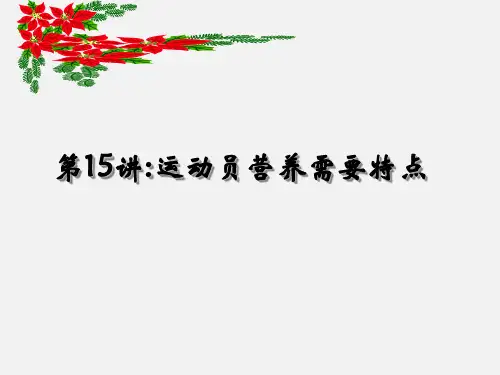
运动营养学英语English:Sports nutrition is a specialized field that focuses on the nutritional needs of athletes and individuals engaged in physical activity. It encompasses the study of how food and nutrients impact athletic performance, recovery, and overall health. Sports nutritionists work closely with athletes to develop personalized nutrition plans that optimize performance, enhance recovery, and minimize the risk of injury. These plans take into account factors such as the athlete's sport, training regimen, body composition, and specific goals. Key components of sports nutrition include macronutrients (carbohydrates, proteins, and fats), micronutrients (vitamins and minerals), hydration, and timing of nutrient intake around training sessions and competitions. Carbohydrates are essential for providing the energy required during exercise, particularly for high-intensity activities, while proteins are crucial for muscle repair and growth. Fats play a role in providing sustained energy during endurance activities and are also important for hormone regulation and cell function. Micronutrients such as iron, calcium, and vitamin D are vital for bone health, oxygen transport, and immune function, all of whichare critical for athletic performance. Proper hydration is essential for maintaining fluid balance, regulating body temperature, and supporting cardiovascular function. Timing nutrient intake before, during, and after exercise can optimize performance and facilitate recovery by providing the body with the necessary nutrients at the right times. In summary, sports nutrition plays a fundamental role in maximizing athletic performance, promoting recovery, and ensuring overall health and well-being for athletes and physically active individuals.中文翻译:运动营养学是一个专门研究运动员和从事体育活动的个体的营养需求的领域。
摔跤吧爸爸关于运动营养学知识的作文Sports nutrition plays a crucial role in the overall performance and well-being of athletes. 运动营养在运动员的整体表现和健康状况中起着至关重要的作用。
It is essential for athletes to fuel their bodies with the right nutrients to optimize their performance. 体育运动员必须用正确的营养物质来为身体提供能量,以优化他们的表现。
Proper nutrition can improve an athlete's endurance, strength, and recovery time. 正确的营养可以改善运动员的耐力、力量和恢复时间。
The right balance of carbohydrates, proteins, fats, vitamins, and minerals can provide the necessary energy for training and competition. 适当的碳水化合物、蛋白质、脂肪、维生素和矿物质的平衡可以为训练和比赛提供必要的能量。
Carbohydrates are the body's main source of energy and are essential for fueling intense physical activity. 碳水化合物是身体的主要能源,对于提供强烈的体育活动所需的能量至关重要。
Athletes should prioritize complex carbohydrates like whole grains, fruits, and vegetables to sustain their energy levels. 运动员应优先选择像整粒谷物、水果和蔬菜这样的复杂碳水化合物来维持他们的能量水平。